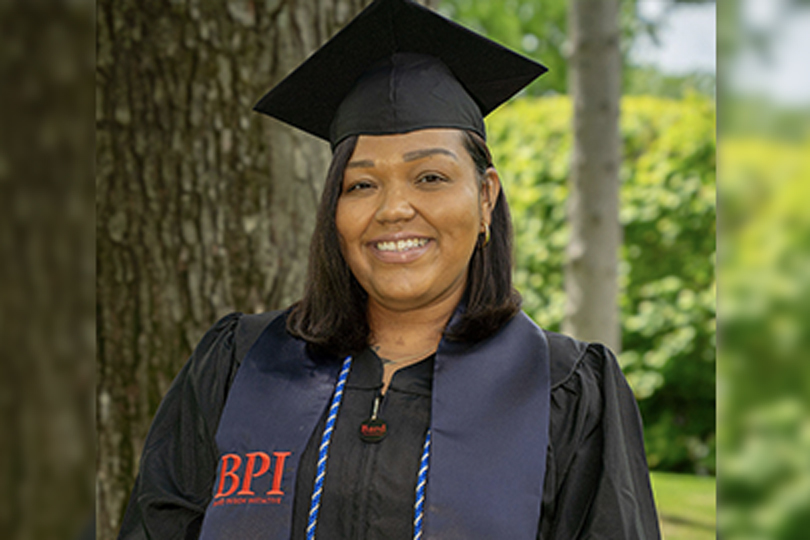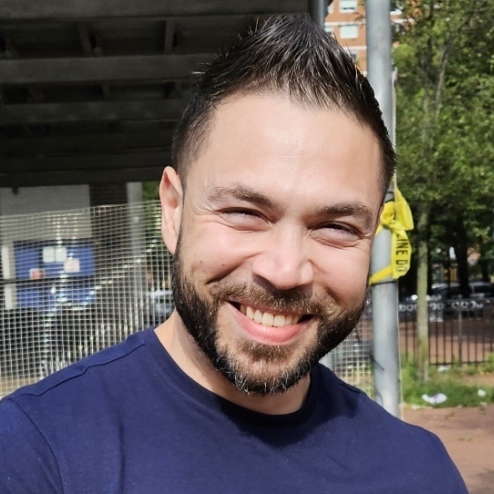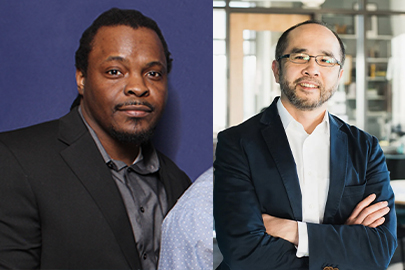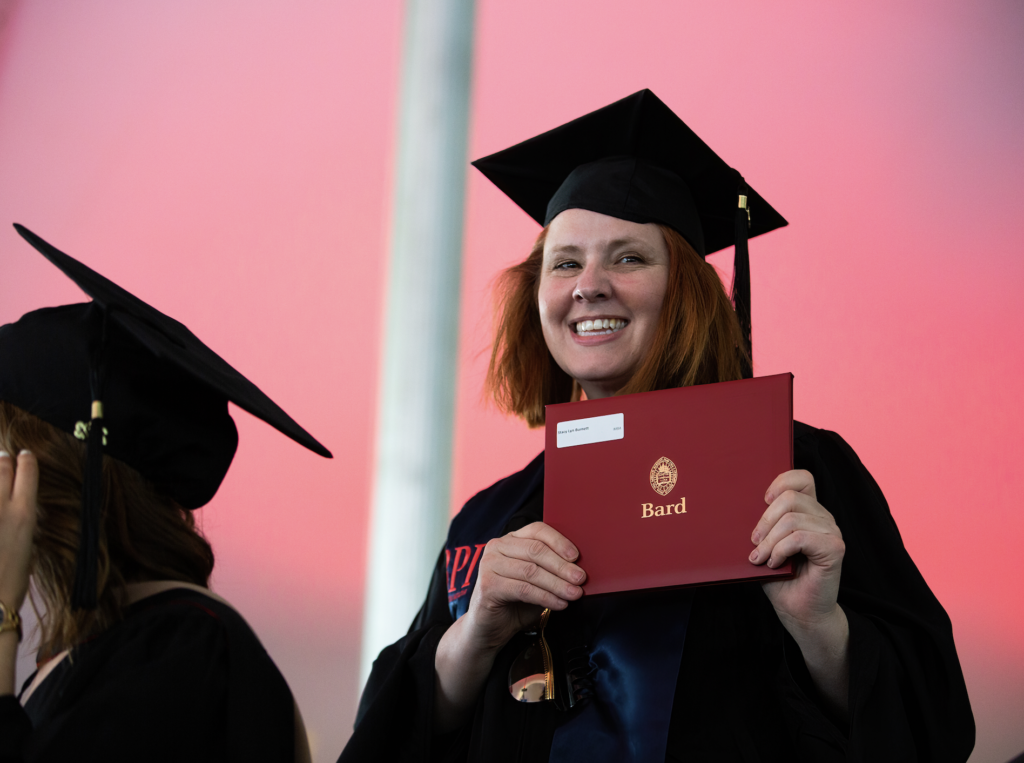
BPI alumnus Elías Beltrán ’17 is completing his PhD in Comparative Literature at Cornell University and will become a member of the Bard Prison Initiative faculty in fall 2023.
This conversation between BPI alumnus Elías Beltrán ‘17 and Megan Callaghan, the program’s Dean, touches upon Elías’s upcoming transition to BPI faculty, the necessity of reframing college-in-prison, and the power and impact of creating educational opportunities for those who struggle to be recognized as students.
First published by the Early College Research Institute, Bard College at Simon’s Rock
MEGAN CALLAGHAN: The spring semester is just starting. What are you teaching at Cornell this semester?
ELÍAS BELTRÁN: I’m teaching a First-Year Writing Seminar, Books with Big Ideas, but I’m calling my section “Stories Not to Pass On”—borrowed from Toni Morrison’s Beloved. While I’ve consistently had the privilege of working with great students, I’m especially excited about teaching at a facility with BPI this Fall.
MEGAN: I’m excited too—it’ll be a fantastic course. And before you start teaching for BPI, you’ll attend an orientation for new faculty. You’ll hear the same things I’ve told all of the faculty who have started teaching college-in-prison for years.
ELÍAS: God, the idea of me as faculty!
MEGAN: You already are! Which is always one of my main points to faculty: we hire faculty because you have a depth of expertise in your subject area and experience teaching it. That’s exactly what we want you to do for BPI, so my goal is to persuade faculty to recognize that BPI is Bard College and to approach teaching the way you would on other college campuses. We don’t want faculty to learn how to be “prison educators.” We spend some time talking through prison rules to make sure everybody knows what they are, but we do that so you can focus on what you’re actually there to do: teach college courses to college students. Students, faculty, tutors, college staff . . . everybody is working together to bring Bard College to life inside the space of the prison.
ELÍAS: It’s a similar excitement to when Andrea Bachner, my Director of Graduate Studies at Cornell, brought up teaching here during my recruitment visit, when I was considering the PhD program. It made me both anxious and excited. But I had to remind her that at the time I only had a bachelor’s degree, and that I earned it in prison. I was even a little alarmed that my acceptance was a gesture in the vein of social justice or a charitable act. Andrea assured me that the department didn’t have enough money to be charitable. She’d read my application’s writing samples and knew I was someone she wanted to work with. She also assured me that by the time I stepped into a classroom to teach, I would know I was ready, and that I’d never feel alone or unprepared. Her comment on my writing brought home the work that Bard-BPI writing professors put into honing our writing skills. The bootcamps and expectations are real, and they were committed to building up our writing. Bachner was right about my preparedness walking into the classroom as the instructor for the first time. I knew I was ready. And while Cornell has done a good job of preparing me to teach, I think my preparedness is also because of the rich heritage of Bard’s own teaching program. I felt I had been prepared to teach long before the formal training had begun. So now, in whatever space I have, I’m looking to challenge my students, deepen their hunger for learning, and to imagine new possibilities—it’s what BPI gave me. And, again, given Bard’s rich teaching heritage, I’m looking forward to further developing my pedagogy as I move into new spaces and explore different possibilities.
MEGAN: That seems like something you’ve been doing for a long time. You may not have taught before grad school, but I remember you working with students while you were still earning your bachelor’s degree and volunteering as a writing fellow. Does teaching feel like an extension of that tutoring work, or is it different now that you’re in the role of professor?
ELÍAS: Just the role—the pay’s not the same! But, yes, it feels close, like a “return to” in a lot of ways, which is why I’m so excited at the prospect of 3 teaching inside a facility with BPI. It’s not just a symbolic return to a place of beginnings for me, but a way of asserting the legitimacy of our aspirations. You’re right: we aren’t just “prison educators.” I will never forget that conversation we shared in Fishkill’s library: you asked me what I hoped to do next since I earned my BA, and when I told you I wanted to go to grad school, that I wanted to teach, you responded that you couldn’t see why not. You said some of our people had to move in that direction, and you couldn’t see why I shouldn’t be one of them.
MEGAN: I love that my message of inspiration was basically, “Sure, why not?”
ELÍAS: Oh, it resonated, and you were saying more than just, “Sure, why not?”
MEGAN: What advice would you give faculty who are about to teach for BPI?
ELÍAS: I think one of BPI’s greatest strengths is their commitment to education above all else, so that would be my advice. The setting in which the classes are taking place is hard to overlook, but if the heart of the work remains intact, it’s easier to overcome the obstacles the setting will undoubtedly present. And, in that vein of “education first” it is about not being afraid to challenge— really challenge—our students. That’s the liberatory work. We may have the inclination for reform, for rehabilitation, for social justice, for righting all the things we’ve come to understand as being wrong, for dismantling the carceral state . . . these latter aspirations are noble, absolutely, but education is our why for doing what we do, so education has to consistently be at the forefront of the mission.
MEGAN: I think that’s really important. This is explicitly not about rehabilitation. But not just that . . . the work of college-in-prison is education. The contexts where it can be hardest to focus on education are precisely the contexts where it is most important to do so. Because if this isn’t real college, what’s the point?
ELÍAS: I think another reason why it’s important to keep that in mind is that withholding education is punitive. When I went in, there were college-in-prison programs in multiple prisons throughout New York state, but as part of then-Governor George Pataki’s hardline punitive stance, and the wider move toward mass incarceration, those programs were snatched away overnight, foreclosing a lot of possibilities, and taking a lot of hope with it.
MEGAN: To provide some context: the United States legislated the destruction of college-in-prison in the 1990s when it made students in prison ineligible for college financial aid. That decision gets misidentified as fiscally motivated, but the evidence is clear now and was clear at the time that college-in-prison has a huge return on taxpayer investment. So the legislation to get rid of college-in-prison wasn’t about money; it was a moral declaration that people in prison do not deserve a college education. Which makes no sense. Why would we deliberately prevent anyone from learning? Our OSUN colleagues who work in the shadow of authoritarian governments know the answer: you exclude groups of people from education in order to control them.
ELÍAS: It’s hard to argue “moral declarations” with people whose morality is rooted in shifty grounds. But, yes, so much of that argument was misframed fiscally and hardline stances were taken against really important aspects surrounding who “deserves” access to higher education. Opponents to access railed that they couldn’t afford to send their own children to college, so why should we be given a “free” education? Maybe that’s one potential meeting place: why should college be so unaffordable for anyone? How can we make it affordable for more people—if not everyone? Cornell’s student meal plan is upwards of $6,600 a year. That doesn’t even touch the cost of classes, books, materials, technology, transportation to and from campus, and simple daily needs. Making college accessible for everyone might make the conversation about access for our incarcerated populations easier or, at least, less fraught. Not being able to see oneself in certain spaces makes us hard-fisted about the possibility of seeing others in those spaces. In a dark way, that is part of the outcry. There will always be naysayers, I think we all know that, but that’s one way of approaching that conversation. We’re also up against a history we don’t want to confront in this argument: the children of the people who threw stones and spit at Ruby Bridges for daring to want access to education don’t want their children to know—or be reminded— that their grandparents were the ones who . . . threw stones and spit at Ruby Bridges. I don’t know how to argue morality with that, since those seem like the people who will never care about the statistical evidence proving that higher education in prison not only carves into recidivism rates, but also has positive impacts on the communities our formerly incarcerated students return to. I’m also not sure that “deserving” is the best way to enter or even further that conversation—at least from our position. I think the idea of “deserving” and who “deserves” is fraught as well, and people latch onto it in ways that really keep us from having honest conversations about what access means both directly (to those with access to education) as well as indirectly (to the communities and even the society which now benefits from our return).
MEGAN: Great point. And that was a successful strategy for a long time: debates about whether individuals were worthy prevented people from seeing the damage done by denying anyone education. Fortunately, Bard and a small number of other colleges recognized that damage back in the 1990s and decided to take responsibility for ensuring that people in prison weren’t cut off from college education permanently. Significantly, Bard committed to conferring the same degree credits and degrees in prison that it confers outside of prison. And at the same time that BPI was operating Bard College degree programs in New York State prisons, it was also part of an effort to restore college-in-prison on a national scale. In just under three decades, we’ve celebrated victories as financial aid eligibility for incarcerated students has been returned both on the federal and, in New York, state level. Now that college-in-prison is poised to expand significantly, what do you most want to see, or hope not to see?
ELÍAS: I think it’s great news, because of the work of people like Max [Kenner], Daniel Karpowitz, Cornell Prison Education System’s (CPEP) Robert Scott and so many others, that more people will be able to access the same opportunities that have unquestionably changed the course of our lives. On a personal note, I would like to see Cornell do what Bard does: confer the same credits and degrees in prison that it confers here on our Ithaca campus. To do otherwise calls our sincerity into question. Apart from that, I would also love to see more work that interrupts the cycle of incarceration in our communities. I think BPI’s Microcolleges and Bard Early College programs are chipping away in that direction, and furthering that work feels really important. I was in “college-bound” classes in my freshman year of high school, but other than additional classwork, I can’t recall how those classes allowed me to see myself in college or university spaces. Working with young people who haven’t been clearly marked or labeled as the brightest or having the most potential, helping those students see themselves outside of and beyond the plight in front of them, that can have the kind of interruptive effect we’re all working toward. [Richard Wright’s] Native Son spoke to me in a personal way because, like Bigger Thomas, I innately understood something was wrong about the conditions I lived in, like there was an entire world against my very presence. But I had neither the vocabulary nor agency to articulate why I felt that, much less the imagination to see my way out of it. Film, theater, dance, music, literature, teaching, science, medicine, political and civic engagement . . . the earlier we can help people from typically underserved communities, from overlooked and ignored educational systems, imagine and see themselves in those spaces, valued and expected there, the more profoundly we can interrupt the cycles of incarceration which mediate conversations about access. And with the restoration of financial aid, more of our people become better-geared to occupy those spaces and help others see themselves there as well.
MEGAN: You mention the Bard Microcolleges, which are a project of BPI in collaboration with community partners. They enroll students of all ages in full-tuition scholarship associate degree programs that are based in person at these trusted community-based institutions. And while some Microcollege students first enrolled with BPI while they were incarcerated; many others don’t have any experience with the criminal legal system. What they have in common is that they are interested in seminar-style liberal arts education but have been deterred from starting or finishing college in the past. You worked at the Bard Microcollege at Brooklyn Public Library (BPL) in its early years, just after coming home from prison. At that point, people were often confused about why BPI was doing college outside of prison. Did you have an answer to that?
ELÍAS: I did encounter questions about the relationship between BPI and the Microcollege, and my thought was that it was a natural extension of BPI’s mission and work: bringing access to higher education directly to those who have typically been excluded from it. Awe is not quite the right word for the sense I got from many people, but there was definitely an appreciation that BPI was pushing what access meant, and what it looked like. Bard, for such a small college, has consistently been at the forefront of social change, of rethinking access and then redoing it. But, again, it’s the focus on education first that makes it all possible. My engagement with the students was always warm. If any of them knew of my own justice-involvement and the fact that I had only been home a few weeks prior to working at Bard’s Microcollege at BPL, it never came up, which I was grateful for. I felt unencumbered of having to “prove” myself. We did a workshop there on quotes and citations, and the level of direct engagement—of discussion, of questions, of hands-on work—reaffirmed that my heart was in the right place about teaching and sharing academic spaces. I got to share with them what I learned during my academic career with BPI. We often did close-reading group work, something the students themselves formed, and there wasn’t a distinction between BPI and the Microcollege. There was simply a group of students committed to maximizing the opportunity and eager to work together. I loved that. The Thursday Lunch Talks were also incredible. The students converged in the conference room for these great talks. There was always a buzz before the talks, and then an even louder din after them. The bonus was the food. I recall how the students shared and served each other, often bringing plates over to other students sitting around the conference tables. It dawned on me that for some of them this was probably the only meal they might have that day, and certainly the healthiest. But it was the talks, imagining the possibilities and outcomes of access to education, that made even that possible.
MEGAN: You also pointed to the Early Colleges as having the potential to interrupt cycles of incarceration. Can you say more about that?
ELÍAS: Well, instead of allowing younger students who have the ability, but maybe with a different skill set or outlook, to languish and drift away, the Early Colleges help them reimagine their own possibilities. It’s nice when we meet a 15- or 16-year-old who has their stuff together, but it’s atypical, and not having it together in a way that’s palatable and obvious doesn’t diminish a person’s potential.
MEGAN: There’s a common philosophy underlying both the Early Colleges and BPI that has to do with the critical importance of the liberal arts, of course, but it’s also about age. The Early Colleges demonstrate that it’s a mistake to restrict college to a small window of time that doesn’t start until you turn 18. BPI works with the same premise but on the other side of the spectrum, agewise. Everywhere that BPI operates full-tuition scholarship degree programs, inside and outside of prison, we try to find adult students with a wide range of ages. Having a 46-year-old and a 26-year-old sitting next to each other in a classroom makes for better discussion and more diverse perspectives on course material. It makes for a richer college community. But it’s not only that. The United States has become very effective at foreclosing opportunities for people at young ages, particularly people of color and people who don’t have money. Mass incarceration is one very obvious illustration of that. So we need to find ways to prevent that foreclosure on the young, and we also need to ensure that people continue to have educational opportunities much later in life.
ELÍAS: I genuinely appreciate that aspect of BPI. I was in my late-30s when I was admitted to BPI at their Elmira satellite campus, and already aware that I was an unconventional student beyond the setting. None of the distinctions of prison-yard politics—race, cliques, neighborhoods, age, orientation—mattered in the classroom. The issues that obscured the commonality of our plight, the immediacy of our predicament, all became clear to us on the page. That was our point of focus, and everything else gave way to that. I saw something very similar at work in the Microcollege, and I was so heartened to see students of all ages and backgrounds sharing that space too. One of the students there, a former Black Panther Party member in her 60s, was a favorite of all of ours. Her thirst to learn, her generosity toward her classmates—both in comments, willingness to work with others, and even in sharing her fruit—couple that magnanimity with her yearning to improve her writing and gain from her classmates . . . she was special, yes, but she was also part of the fabric that makes Bard-BPI so strong. Cheesy, I know, but it’s another of the things that makes me proud to be part of the BPI community. Does anything still surprise you about BPI?
MEGAN: I was surprised last week when someone asked how many BPI students have enrolled in Bard after leaving prison; I looked it up and found that more than 50 students have. By graduation season this spring, BPI students will have earned more than 700 degrees while still incarcerated, but many students leave prison before completing a degree. When that happens, students may transfer to other colleges and universities and take their Bard credits with them. But I had never thought to count how many students have continued with Bard, specifically, and I was pleasantly surprised to see that it is now more than 50. That includes students who enroll at the Bard Microcolleges, students who work with Senior Project advisors, and students who come to take courses in Annandale.
ELÍAS: Wow . . . that is a pleasant surprise. I know that when I was inside, many of the students spoke of Bard as a kind of abstraction, almost a fairytale place. It stretches my heart to know that so many have made the fairytale real. I visited the campus shortly after my return, and was instantly swept up by its beauty. I was also awed to come across some of the professors I’d taken classes with at BPI. It made me realize that, yes, I am part of not just BPI, but Bard as well.
MEGAN: I asked you what you would tell new faculty. What about students? What do you want new students to know as they are coming into college through BPI, or perhaps deciding whether to apply?
ELÍAS: Commit. Commit to your education. Be committed like nothing else to it and value the time you have for it. Another thing is to not be afraid to ask questions, to acknowledge the gaps in your knowledge and then work at filling those gaps, including asking for additional readings and material. Last thing is to believe in yourself unflinchingly. I once told a friend that I wanted to teach when I got out and they responded with a look of disdain. They actually said to me, “You think that with your background and where you’re coming from that somebody’s going to let you into their classroom?” Well, I’ve taught Spanish here, several First-Year Writing Seminars, and a cross-listed class for Government and American Studies on mass incarceration. So, yes, I’ve gotten into “somebody’s” classroom and magic has happened.
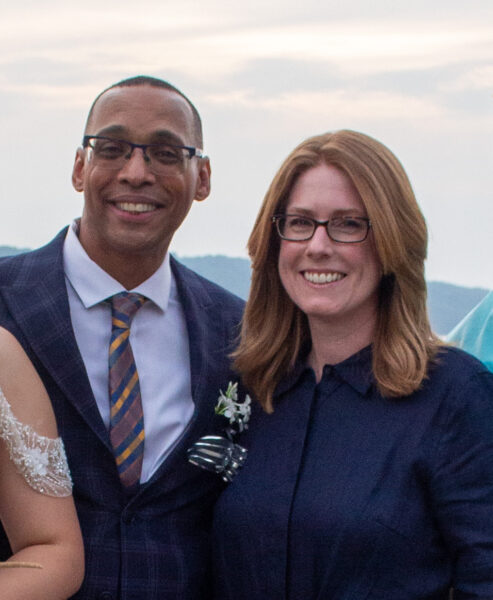
The authors, summer 2023
ELÍAS BELTRÁN is completing his PhD in Comparative Literature at Cornell University and will become a member of the Bard Prison Initiative faculty later this year. His research focuses on postcolonial and decolonial trauma, as well as the history and culture of the Caribbean and its literature.
DR. MEGAN CALLAGHAN is a cultural anthropologist and Dean of the Bard Prison Initiative.
The Bard Prison Initiative (BPI) currently operates full-tuition scholarships for Bard College degree programs across seven New York State prisons, three Microcollege campuses created in partnership with community-based institutions, and on the Annandale campus of Bard College, where adult students are completing degrees through the BardBac. Since 2005 when the first degrees were granted to BPI students, the program has issued over 5,000 credits and more than 700 degrees.
Recommended Citation
Beltrán, Elías and Callaghan, Megan (2023) “Commitment to Access: A Conversation about the Unconventional and College-in-Prison,” Early College Folio: Vol. 2: Iss. 2, Article 8.
Available at: https://digitalcommons.bard.edu/earlycollegefolio/vol2/iss2/8
